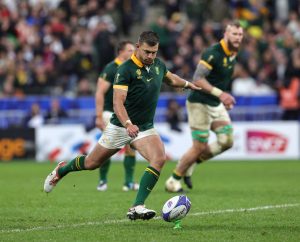Jantjies must be supported & not ostracized
Springboks flyhalf Elton Jantjies must be applauded and supported for fronting his issues with substance abuse, writes Mark Keohane.
There must be no condemnation of Springboks flyhalf Elton Jantjies because of an addiction that led to him admitting himself to rehabilitation.
Recreational drug use is a reality in life and elite sports people are a part of this life.
They are not immune from the temptations or the consequence of those temptations.
It has always amazed me at how the alcohol binge drinking culture in sport is supported so easily and excused, but the moment a player has an issue with a drug then the first instinct is to send that person to the darkest of places and view them as some sort of evil outcast.
Sports Federations and teams also need to front the reality that players take recreational drugs, as much as they do know that so many players indulge in alcohol.
In 2006, former Australian Rugby League and Rugby Union international winger Wendell Sailor was banned for two years from rugby union after testing positive in a random test for recreational drugs.
He admitted to having taken cocaine at a midweek party. He accepted his two year ban and said the time away from the game gave him perspective on all things.
At about the same time New South Wales Waratahs fullback Cameron Shepherd was arrested for malicious damage to property, for jumping on car roofs, for urinating in public and for being drunk and disorderly in public.
The Waratahs, back then, used to have what they called ‘Mad Monday’ at the end of the season. They would party over the weekend and into the Monday and every sort of behaviour was excused.
Shepherd was fined, given a slap on the wrists and suspended for one game. He was playing Test rugby a fortnight later.
His disgraceful behaviour was a far greater crime than Sailor’s, whose sin was to take a gram of cocaine at a party.
My point is that players take recreational drugs and players drink alcohol excessively. Both have consequences and there should be no distinction in what the player’s poison is when it comes to addiction. There should be intervention and there should be support.
Professional sport has a zero tolerance policy on any recreational and performance enhancing drugs and players know this. To quote Sailor at the time, being a sport’s professional, he knew the risk of a ban.
Fair play to him for copping it on the chin and dealing with it.
There is nothing among sport’s lawmakers that singles out alcohol use or abuse. It is an accepted social form of recreation.
In the past few seasons, several high profile rugby players have admitted to recreational drug abuse and when they have told their story publicly it has told of how their word was turned from a momentary and manipulated high to a life low.
Equally, those players who have confessed to alcohol abuse and addiction.
It has never made for an easy read and you would have to have ice in your veins not to feel the pain and loneliness of these players when they tell their respective life stories.
Jantjies is no exception.
He has not officially been tested positive for anything and faces no ban from the sport.
His fight now is with himself and getting himself into the healthiest mental and physical place.
I hope he succeeds, is able to abstain in the biggest battle of his life, and is able to walk tall for all the right reasons, in life and as a professional rugby player.
I also hope that people, in a position of influence in the industry, acknowledge the reality of the issues that face players and that supporters accept that these players are human and are as vulnerable as any and each one of us to temptation and to the possibility of addiction.
Players who stumble because of addiction must be helped and not ostracized.
I wish him and his family well in his recovery.
SA Rugby Mag reports on Elton Jantjies rehabilitation for drug use






